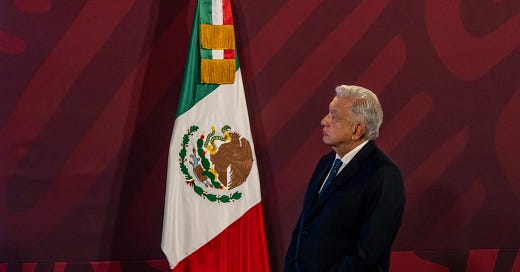U.S. law enforcement officers spent years investigating allegations that allies of Mexican President Andrés Manuel López Obrador met with and took millions of dollars from drug cartels, after he took office in 2018, according to a report published by the New York Times yesterday.
The U.S. never opened a formal investigation into AMLO, and the inquiry was shelved after officials “concluded that the U.S. government had little appetite to pursue allegations against the leader of one of America’s top allies,” reports the New York Times.
AMLO forcefully rejected the allegations, which he called “completely false,” yesterday. He also revealing the contact details of New York Times journalist Natalie Kitroeff, including her telephone number. Mexico is one of the most dangerous countries in the world for reporters, and AMLO has had a conflictive relationship with the media. Mexico’s freedom of information body immediately said it would launch an investigation into his revelation of a journalist’s personal information. (Guardian, New York Times)
“Much of the information collected by U.S. officials came from informants whose accounts can be difficult to corroborate and sometimes end up being incorrect,” notes the New York Times. “The investigators obtained the information while looking into the activities of drug cartels, and it was not clear how much of what "the informants told them was independently confirmed.”
AMLO said the report would not affect relations with the U.S., but that he expected a response from Washington. Earlier this month, AMLO nearly canceled a high-level meeting with U.S. officials on fentanyl and migration after a series of reports on DEA investigations into whether his unsuccessful 2006 presidential campaign benefited from drug money. (See Feb. 1’s post.) López Obrador denied those allegations.
López Obrador said yesterday that he would maintain good relations with the U.S., but that foreign agencies would not be allowed to investigate Mexican officials, reports the Washington Post. “There is cooperation, there has to be,” López Obrador told his daily news conference. “But we won’t accept subordination, or interventionism.”
The controversial reports come as Mexico heads to national elections in June, and opposition groups have latched on to signs of cartel-influenced corruption in López Obrador’s circle, reports the Guardian. AMLO is not eligible for reelection, but his protégé Claudia Sheinbaum is leading in polls.
Regional Relations
Salvadoran President Nayib Bukele received a rock-star welcome at the CPAC conference in the U.S. yesterday, where he told American conservatives to "put up a fight" against the "global elites" in order to get their country back. (BBC)
U.S. opposition to an immediate cease-fire in Gaza was repeatedly criticized at the two-day G20 ministerial meeting in Brasilia this week, “the latest sign of Washington’s isolation on the issue,” reports the Washington Post. (See yesterday’s post.)
Brazilian President Luiz Inácio Lula da Silva’s criticism of Israel’s actions has put the issue in the diplomatic spotlight this week. “Amid frictions with some in the West, Lula has chosen to focus his foreign-policy muscle on rallying the global south,” writes Catherine Osborn in the Latin America Brief.
“Brazil has said its priorities for its G-20 presidency include combatting world hunger, reforming multilateral organizations including the IMF and World Bank, and giving fairer sovereign debt treatment to struggling borrowers. Accomplishing those goals depends on building strong coalitions,” and many African countries have supported Lula’s initiatives, writes Osborn. (Latin America Brief)
Brazil’s government announced that Lula will meet with his Russian counterpart, Vladimir Putin, in October when the two leaders attend the BRICS summit slated to be held in Russia, reports Bloomberg.
Haiti
The U.S. intends to provide $200 million to a planned Kenya-led multinational security support mission in Haiti, said Secretary of State Antony Blinken yesterday. (CNN)
Canada announced $91 million for Haiti, yesterday, including funds for the the multinational mission, reports Reuters.
Regional
The legalization and decriminalization of abortion in several of Latin America’s most populous countries has created a new geography of reproductive rights in the region. “The legal differences among Latin America’s major powers have given rise to an informal network of nongovernmental organizations, activists and abortion clinics who work — sometimes publicly, but more frequently in secret — to provide regional travel assistance and funding to pregnant women who live in countries where abortion remains illegal,” reports the Washington Post.
Migration
Venezuela stopped accepting migrant deportation flights from the U.S. and Mexico, following through on a threat after Washington reimposed some of the economic sanctions it had previously lifted on Venezuela, a reversal of a thaw between the two countries that started last year. (Wall Street Journal)
“Illegal border crossings into the United States have fallen 50 percent since the end of December,” reports the Washington Post. “Border crossing trends also appear to be shifting,” from Texas westward, a change Texas Governor Greg Abbott ascribes to his state led crackdown on migration.
Honduras
The U.S. trial of former Honduran President Juan Orlando Hernández “has captured public attention within Honduras and its diaspora,” reports Al Jazeera.
Colombia
Colombia will put nature at the heart of the international environment agenda in this years COP16 in Cali, according to the country’s environmental minister Susana Muhamad. (Guardian)
Argentina
Argentina’s Milei administration said it would shut down the country’s national anti-discrimination agency as part of it’s austerity push, saying the institute served "no purpose." (AFP)
Culture Corner
A quiet revolution is taking place in Argentina’s meat-venerating food culture. Beef consumption declined by 10 kilos per person per year between 2018 and 2021, spurred by a combination of runaway inflation, increasing popularity of other meats, and a rise in the number of vegetarians, reports the Guardian.






